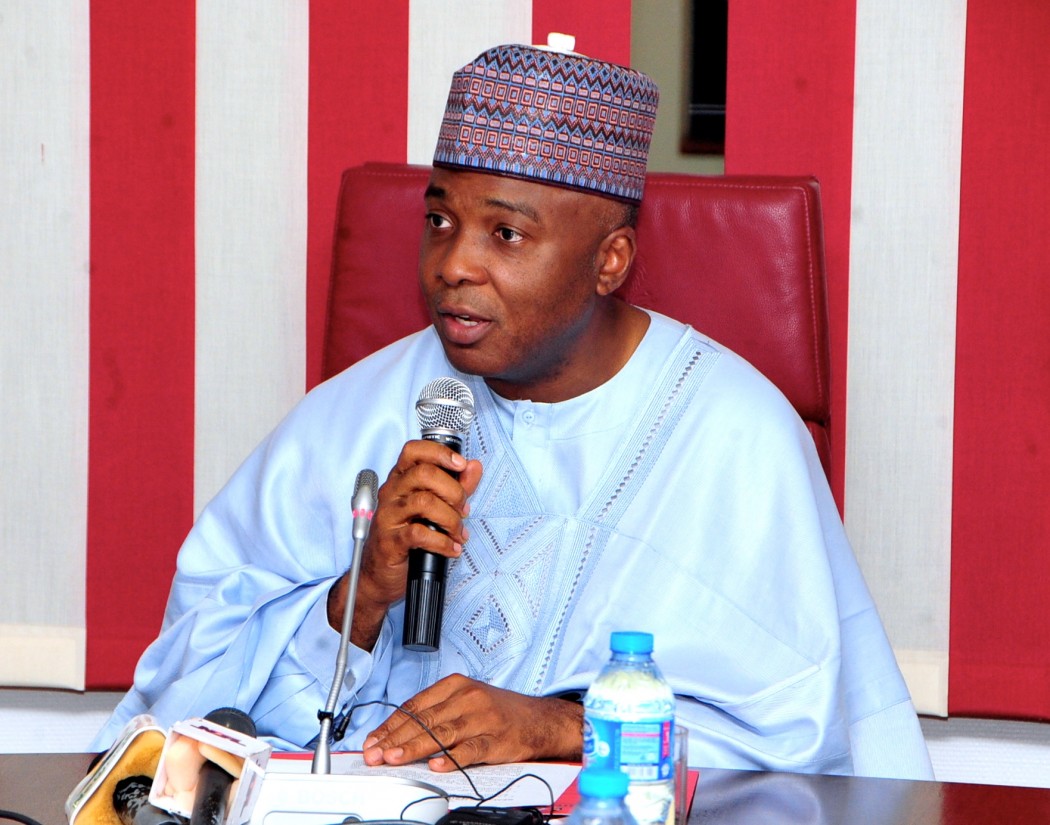When on June 9, 2015, Senator Abubakar Bukola Saraki emerged as President of the Nigerian Senate against the wish of some powerful forces in the All Progressives Congress (APC) many political observers felt that the party would simply move on to capitalise on its new control of the National Assembly to ensure cohesion in the legislature.
The expectation was based on a precedent set by the former Speaker of the House of Representatives, Aminu Waziri Tambuwal, who in a similar fashion emerged as Speaker against the calculation in the upper echelons of his party, Peoples Democratic Party.
The then opposition, which incidentally is today’s ruling party not only applauded Tambuwal, but became his pillar of support throughout his tenure to the point of his defection to their fold. However, the same characters that encouraged and supported Tambuwal have since Saraki’s emergence changed the tone of the music in favor of so- called party supremacy.
Few months into his leadership, Saraki’s detractors resorted to using state apparatus in their avowed desperation to oust him and install their lackey that will do their bidding.
The desperation reached its zenith when the Senate President was framed with allegations of violation of the false declaration in his Code of Conduct Asset form while serving as governor of Kwara state, a position he vacated five years ago.
The Code of Conduct Tribunal was enlisted for the dirty job by these powerful forces and Saraki was dragged before it in a manner that exposed the real motive of his enemies, and confirmed the suspicion of many observers that the trial that was just robbed in the garb of anti-corruption campaign is actuality a devious plan to persecute the ‘recalcitrant’ member.
Looking at the whole process of the trial, no discerning observer will fail to note the main objective of the trial that is to harass, intimidate, embrace and hound Saraki out of office. The charges, even to a layman were filed against all known due process and in clear contravention of the law.
Being that the charges against Saraki bordered on alleged false declaration of asset while serving as governor in 2003, one expected that the process of investigation and prosecution should be left solely in the hands of the Code of Conduct Bureau (CCB) as provided by the Code of Conduct Bureau/Tribunal Act.
However, in their desperation to nail the Kwara-born politician, the enemies within engaged the services of EFCC to do their bidding. Revelations at the last sitting of the tribunal reinforced what is already in public domain that in prosecuting Saraki, his traducers by design or default shot themselves in the foot by neglecting to ensure compliance with the relevant section of the CCB/T Act. That is the provision of Section 3 (d) of the Act which requires any discrepancy or anomalies in asset declaration to be brought to the notice of the concerned public office holder before he is dragged to the Tribunal.
In fact, a precedent was established by the same Tribunal and incidentally the same judge that cited non compliance with that provision of the Act to free former Lagos state governor, Bola Ahmed Tinubu, who was dragged before it for alleged false declaration in 2011 is sitting atop the tribunal.
Saraki’s lead counsel and former Attorney General of the Federation, Chief Kanu Agabi, while addressing the Tribunal at the last sitting recalled the trial of Tinubu, who was set free by the tribunal because of the failure of the CCB to fulfill necessary conditions before dragging to the tribunal for operating foreign accounts and other corrupt practices.
Agabi maintained that a similar decision as given in the Tinubu case should have been applicable to his client having set a precedent, and also referred to the case of ten former governors who had the opportunity of being invited to defend their asset declaration and therefore not referred to the tribunal after clarifying issues associated with their declaration.
Looking at the charges against Saraki, it will reveal that some of the alleged breaches were said to have been committed many years ago when he was serving as governor of Kwara State.
Even though time does not run against crime, many are wondering why it took the CCT (EFCC) 12 years to complete their investigation and bring the matter to trial. It is obvious that part of the sins of the former governor is that he emerged as the President of the Senate against the wishes of a cabal within the APC.
The trial has implanted a reasonable suspicion in the minds of many Nigerians that the CCT is now a tool in the hands of the party to punish Saraki for his “disobedience”.
The argument that Saraki’s trial is a credit to the political will of the current administration to fight corruption, no matter the status of who is involved is baseless. the case before the tribunal does not involve stealing or diversion or misapplication of public funds.
How was Saraki selected among thousands of declarants? Shall we then take this trial as a coincidence or a well-rehearsed plan to use someone as a scapegoat?
As the Tribunal reserved ruling on Saraki’s motion challenging its jurisdiction to March 24, 2015 all eyes will be on CCT chairman, Danladi Umar to see how far he can go with his Conscience. Will he tread the path of justice and engrave his name in a hall of honour or will he succumb to the pressure of the cabal that regards the nation as an extension of their personal estate? Nigerians await his decision.
Isa Mohammed is a public affairs analyst.
The opinions expressed in this article are solely those of the author.







